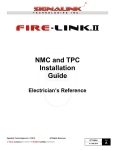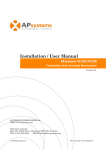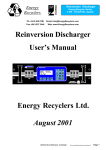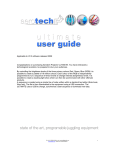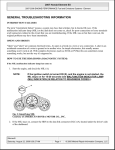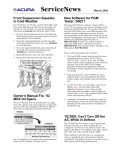Download 1 - Honda
Transcript
iST Owner's Manual Click to Save As Table of Contents Control Head Operation - - - - - - - 1 Keypad Operation - - - - - - - - - 2 Notes - - - - - - - - - - - - - - 3 System Startup - - - - - - - - - - 4 Trolling Control (Bump Mode) - - - - 5 Warm Mode - - - - - - - - - - - 6 Slow Mode - - - - - - - - - - - - 7 A few words about safety Your safety and the safety of others are very important. And using this outboard motor safely is an important responsibility. To help you make informed decisions about safety, we have provided operating procedures and other information on labels and in this manual. This information alerts you to potential hazards that could hurt you or others. Of course, it is not practical or possible to warn you about all the hazards associated with operating or maintaining an outboard motor. You must use your own good judgment. Trim Control - - - - - - - - - Sync Mode - - - - - - - - - Station Transfer - - - - - - - - Configuration Mode - - - - - - Troubleshooting and Alarm Codes - Alarm Codes - - - - - - - - - Emergency Return to Port Capability - - 9 10 11 13 15 16 17 You will find important safety information in a variety of forms, including: • Safety labels — on the outboard motor • Safety Messages — preceded by a safety alert symbol words, DANGER, WARNING, or CAUTION. and one of three signal These signal words mean • DANGER You WILL be KILLED or SERIOUSLY HURT if you don’t follow instructions. • WARNING You CAN be KILLED or SERIOUSLY HURT if you don’t follow instructions. • CAUTION You CAN be HURT if you don’t follow instructions. • Safety Headings — such as IMPORTANT SAFETY INFORMATION. • Safety Section — such as OUTBOARD MOTOR SAFETY. • Instruction — how to use this outboard motor correctly and safely. This entire book is filled with important safety information—please read it carefully. NOTICE: Your outboard motor or other property can be damaged if you don’t follow instructions Control Head Operation 1 Gear Operating Range handle controls gear position N G E RE VE R G FORWARD WOT The neutral transmission position is indicated by a spring detent. With the handle in this orientation, the transmission is positioned in neutral gear. REVERSE WOT E ENGINE SPEED IS CONTROLLED FROM IDLE TO FULL THROTTLE NG ENGINE SPEED IS CONTROLLED FROM IDLE TO FULL THROTTLE RA FOR WA R TI N RA DO PE R PE AT I O N RA SE G AL POSITION NEUTR Keypad Operation Single Engine Multi Engine 2 1 3 4 Neutral gear position indicators Select station indicator WARM indicator 5 1 2 Station SELECT button: used to transfer station control from one station to another (page 11). WARM button: will activate warm mode (page 6) when control handle is in Neutral. (-) Troll Control Down (+) Troll Control Up 3 4 SELECT Button & Indicator 6 5 SYNC Button & Indicator: allows all engines to be controlled from one control handle (page 11). 6 SLOW Button & Indicator : used to transfer station control (page 11) and in conjunction with the SLOW button to change engine throttle response to approx. ½ normal range. Engine Trim (Up/Down): Buttons provide independent trim of Port or Starboard engines. NEUTRAL Indicators WARM Button & Indicator: locks gear in neutral; throttle only (page 6). (+) Troll Control Up (-) Troll Control Down Button light key: OFF ON BLINKING 2 Notes 3 NOTICE Only use proper oil filter • iST equipped engine require use of an oil filter with a maximum body diameter of 65 mm. • Oil filter part number 15400-PLM-A01 or equivalent. • Use of a filter other than specified can lead to loss of oil and damage to the engine. • Max oil filter diameter 65 mm. System Startup 1 Neutral Position Control handles must be in the neutral position prior to starting the control system. This procedure explains the process of starting up the iST system. 3 Check System Lights MULTI–ENGINE CONTROL NEUTRAL The system is on when the neutral indicator lights and SEL lights are fully illuminated. Neutral control handle position; handles at vertical. 2 Turn System On Turn on the system with the ignition keyswitch or enable switch. Do not move the handles for five seconds while the system runs diagnostics during start-up. If the SEL light blinks slowly, the control handles are not in neutral. Move the handles to neutral and the system will start. If all keypad lights blink simultaneously, system is in alarm mode. Shutdown system and proceed to Alarm Code Retrieval (page 15) before restarting. SINGLE ENGINE CONTROL NEUTRAL WARM SEL SYNC NEUTRAL SLOW WARM SEL SLOW WARM NEUTRAL WARM NEUTRAL SEL SLOW SEL SYNC NEUTRAL NEUTRAL SLOW NEUTRAL WARM SEL NEUTRAL SEL SYNC SLOW WARM SLOW 4 Trolling Control (Bump Mode) 1 5 Change engine speed in small increments while cruising Increase or Decrease Throttle Settings During normal cruise mode you can “bump” engine throttle settings in small increments while handles are in gear above Idle. MULTI– ENGINE CONTROL Increase Engine Speed Press and release WARM (+) to increase engine speed. There will be no light indication when the WARM (+) button is pressed. NEUTRAL Press and release SLOW (-) (on 8-button keypads, SEL (-) on 2-button keypads) to decrease engine speed. There will be no light indication when the SLOW (-) button (on 8-button keypads, SEL (-) on 2-button keypads) is pressed. NEUTRAL WARM SEL SYNC Decrease Engine Speed SINGLE ENGINE CONTROL NEUTRAL SEL SLOW WARM SEL SLOW WARM SLOW NEUTRAL WARM SEL SYNC NEUTRAL SLOW NEUTRAL Warm Mode 1 Enter Warm Mode To enter warm mode, the control handles must be in neutral. Press and release the WARM button one time. NOTE: It is strongly recommended that the system be placed in warm mode at all times when the boat is docked. Locks gearshift in neutral while allowing throttle operation 2 Exit Warm Mode To exit warm mode and regain gear operation, bring handles back to neutral and press and release the WARM button one time. When control handles are in the neutral position and you press the WARM button once, the WARM indicator should not be illuminated. NOTE: Control handles must be in the neutral position before entering or exiting WARM mode. NEUTRAL SEL SLOW WARM When control handles are in the neutral position, press WARM once. NEUTRAL NEUTRAL WARM SEL SYNC SLOW The neutral gear indicators should be illuminated before pressing the WARM button. * throttle only, no shift. 6 Slow Mode 1 2 Enter Slow Mode To engage control handles, you must be in neutral. Slow mode can only be engaged or disengaged when the control handles are in neutral. On single-engine boats, press the SEL and WARM buttons simultaneously to enter slow mode. SEL and WARM lights will flash when the iST system is in slow mode. On multi-engine boats, press the SLOW button to enter slow mode. The SLOW light will illuminate to indicate the system is in slow mode. SEL Once engaged, advancing the control lever into engine throttle operating range will only result in approximately half of normal throttle output. Engine throttle operating range FORWARD IDLE NEUTRAL WARM SEL SLOW Using Slow Mode NEUTRAL NEUTRAL NEUTRAL 7 Throttle operation will result in approximately half of normal throttle output WARM SYNC SLOW FULL FORWARD When SEL and WARM lights are blinking, response to control handle movement will result in half of normal output. Slow Mode 3 (cont.) Exit Slow Mode To disengage slow mode, proceed as follows: On single-engine boats, press SEL and WARM to exit slow mode. On multi-engine boats, press the SLOW button to exit slow mode. NEUTRAL NEUTRAL NEUTRAL SEL SLOW WARM WARM SEL SYNC SLOW 8 Trim Control 1 This allows the boat operator to control the trim/tilt of the engine drive unit from the control handle or keypad. 2 Control All Engines Simultaneously NOTE: System must be on for trim on control handle to work. To control all engines trim simultaneously, press and release trim toggle switch located on the port control handle. 9 Control Port & Starboard Separately Individual trim for three or four engines is done on an auxiliary panel. With each press and release of the trim buttons, the engine drive units will respond incrementally. For large movements of the engine drive unit, buttons will need to be pressed and held until desired position is reached. Control Handles may be in any position to operate trim control. Toggle up to trim outboard in an upward position. Toggle down to trim outboard in a downward position. To control port and starboard trim/tilt separately, press and release port or starboard trim button located on the center of the keypad. Used for single engine boats Used for multi engine boats Sync Mode 1 While sync mode is engaged, the iST system will automatically control the slave engine speed to exactly match the lead engine speed. Enter Sync Mode To engage, handles should be in or above idle — press & release the sync button one time (SYNC light will illuminate). Sync mode can only be used when both engines are in the forward gear and handles are approximately the same position — within 10% of total travel. 2 Using Sync Mode When sync function is energized, the boat operator controls all engines from the port engine control lever. The system will automatically control the other engines to match the speed of the port engine. 3 Exiting Sync Mode To disengage, match the position of both engine control handles and press and release SYNC button one time. Starboard handle is inactive. SYNC light will be ON when in SYNC Mode. NEUTRAL NEUTRAL WARM SEL SYNC SLOW The sync mode will be automatically disengaged NEUTRAL PORT ENGINE NEUTRAL WARM SEL SYNC SLOW The sync light is off when sync mode disengage—system is now in cruise mode. 10 Station Transfer 1 Determine Active Station If the SEL light is fully illuminated (not blinking), station is “active” and in control of engine’s gear and throttle (neutral lights will only be on if gear is in neutral position). This procedure allows the propulsion system to be transferred from one helm control station to the other. 2 Determine Inactive Station Prior to pressing the SEL button at the station where you wish to take control, the SEL light & appropriate gear light will blink once every 2 seconds (inactive station heartbeat). Begin station transfer at the helm station where you wish to take control Press and release SEL button one time, at the helm station where you want to take control (the SEL light will begin to flash). NEUTRAL NEUTRAL WARM SEL SEL light and appropriate gear lights will flash one time NEUTRAL WARM SLOW SYNC NEUTRAL WARM SEL SLOW SYNC NEUTRAL SINGLE ENGINE NEUTRAL SEL MULTI-ENGINE SLOW NEUTRAL every two seconds. SLOW SYNC SEL 3 11 The SEL light and appropriate gear lights will flash when SEL button is pressed at the inactive station. WARM NEUTRAL NEUTRAL SEL SLOW WARM SEL SLOW WARM Station Transfer 4 Determine Appropriate Handle Position After you press & release the SEL button once, the SEL light & appropriate gear lights will blink—blink rate will depend on control handle setting at the station taking control. • Slow blink: handles not in appropriate position. • Quick blink: handles are in the appropriate position; proceed to step six. NEUTRAL This procedure allows the propulsion system to be transferred from one helm control station to the other. 5 Prepare the Station Handles Control handles must be in the appropriate handle position at the station taking control in order for transfer to be completed (see chart below). When handles are in appropriate handle position for transfer, the SEL light will begin to flash quickly. Control handles at the active station can be in any position prior to transferring control to another station. Control handles at “station taking control” must be in appropriate handle position to transfer control to it. 6 Use the Desired Station Press and release the SEL button a second time at the station where you want to take control. The new control station is now the active station and has control of the engine and transmission. The SEL light and appropriate gear lights will be fully on (not blinking) after SEL button is pressed for the second time to indicate this station is in control. WARM SLOW SYNC The following positions are acceptable for transferring station control: NEUTRAL NEUTRAL NEUTRAL SEL WARM SEL NEUTRAL SLOW SYNC SEL NEUTRAL SEL SLOW WARM ACTIVE STATION DESIRED STATION • In neutral • In gear / idle • In gear / with speed • In neutral / idle • In same gear • Same or slower speed setting SLOW WARM NOTE: You can always take control when inactive handle is at the neutral position, no matter where the active handle is located. 12 Configuration Mode Enter Configuration Mode 1 Choose Menu & Select OFF • Turn System Power Off ON • All engines must be turned off 2 • Move control station handles to Full Throttle position 3 • Turn System Power On 4 • Press & release WARM (on 8-button keypads, SLOW on 2-button keypads) button three times OFF 1 Cycle through menu options Press and release the SYNC (on 8-button keypads, SEL on 2-button keypads) button to cycle through menus. 2 WARM Select desired menu Press and release the SLOW (on 8-button keypads, WARM on 2-button keypads) button to enter into the selected menu. The menu selection will remain flashing on the SYNC LED (on 8-button keypads, SEL LED on 2-button keypads), followed by the current configuration setting, indicated by the SLOW LED (on 8-button keypads, WARM on 2-button keypads). • This is the Configuration Mode Main Menu • Make desired changes following the menu & selection instructions to the right NEUTRAL 6 OFF ON OFF Cycle through available settings for selected menu Press and release the SYNC button (on 8-button keypads, SEL on 2-button keypads) to cycle through menus. SLOW LED (on 8-button keypads, WARM on 2-button keypads) will flash the appropriate number of times to indicate the new selection for that menu item. Refer to the chart on page 14 for the list of menu settings. 2 Store the desired setting for the selected menu item Press and release the SLOW button (on 8-button keypads, WARM on 2-button keypads) to store the selected setting. The system will automatically return to the main configuration menu with all the LEDs flashing. 3 After configuration changes are made, turn the ignition switch off and then on again to restart the control system. NEUTRAL WARM SEL • After configuration changes are made, turn the ignition switch OFF and then ON again to restart the control system. 1 ON • Only turn on the ignition switch of one engine to on position NEUTRAL SEL SYNC 13 Choose Option & Select Menu options will be shown by the number of times the SYNC (on 8-button keypads, SEL on 2-button keypads) LED flashes. Refer to the chart on page 14 to see which LED combination indicates which menu. • All LEDs begin flashing 5 Allows you to set speed increments, define the startup mode, and reset to factory settings. WARM SLOW SLOW ON PRESS TO CYCLE PRESS TO SELECT multi-engine keypad PRESS TO CYCLE PRESS TO SELECT single engine keypad Configuration Mode Speed Increment (“throttle bump”) size configuration — Menu 4 Option Number Speed Increment step size 1 0.5% 2 (default) 1.0% 3 1.5% 4 2.0% 5 2.5% 6 3.0% 7 3.5% 8 4.0% Cont. These are the only Configuration Menus that are available for end user adjustment. For information on other configuration menus, refer to the Service Manual. To reset Factory Defaults, select Configuration Menu 7. There are no Options with this Menu – when it is selected, all options are set to their default settings. Startup Mode Configuration — Menu 5 Option Number Startup Mode 1 (default) Normal Run Mode 2 Start in Warm Mode Reset Factory Defaults — Menu 7 Option Number Startup Mode 1 (default) Selection resets to factory defaults 14 Troubleshooting and Alarm Codes 15 If at any time the system is unresponsive, return all handles to the neutral position and restart the system. Additionally, if it is necessary to restart an engine, for any reason, all handles need to be in the neutral position. Activate Alarm Code Retrieval 1 • Turn System Power Off 2 • Move control station handles to Full Throttle position 3 • Turn the ignition switch of one engine to the ON position. 4 OFF Display Alarm Code Statistics 1 ON • All engines must be turned off OFF NEUTRAL SEL CODE CATEGORY NEUTRAL press to cycle through alarm codes WARM • Multi- engine keypad – press and release SYNC and SLOW button together, 3 times NEUTRAL WARM NEUTRAL WARM SLOW SYNC • After alarm codes have been retrieved, turn the ignition switch off and then on again to restart the control system. OFF ON OFF ON 2 3 • Single engine keypad – “Code Category” flashing on SEL light / “Code Detail” flashing on WARM light • Multi engine keypad – “Code Category” flashing on SYNC light / “Code Detail” flashing on SLOW light • Press and release the SEL button(on 8-button keypads, SYNC on 2-button keypads) to advance through other alarm codes in memory • The most recent 16 alarm codes are stored in system memory SEL WARM SYNC NEUTRAL CODE DETAIL NEUTRAL SEL 5 SLOW • Single engine keypad – press and release SEL and WARM button together, 3 times SLOW • “Code category” is indicated by number of flashes on left light. This will indicate the type of alarm code that has occurred • “Code detail” is indicated by number of flashes on right light. This will indicate the specific component which is causing the alarm code ON • Press & release Code buttons three times SEL Retrieve Alarm Codes After activating Alarm Code retrieval, the most recent alarm code will be flashing on the control head lights: SLOW 4 • After alarm codes have been retrieved, turn the ignition switch off and then on again to restart the control system. OFF ON OFF ON Alarm Codes Code Category 1 — Actuator Communication Alarm Code Category 11 – Throttle actuator position alarm Code Category 14 — Gear actuator feedback alarm Control Head lost communication with the ECU on engine indicated in Code Detail Throttle actuator is not responding correctly to ECU command Gear actuator feedback sensor is out of range Possible faults Code Detail 1 Engine control unit failure, communication cable failure, control head failure Port Engine Code Detail 2 Stbd Engine Code Detail 3 Port (Inboard) engine Code Detail 4 Stbd (Inboard) engine Possible faults Throttle Actuator failure, throttle cable adjustment error Code Detail 1 Port Engine Code Detail 2 Stbd Engine Code Detail 3 Port (Inboard) engine Code Detail 4 Stbd (Inboard) engine Possible faults Gear actuator feedback sensor failure, ECU failure, wire harness between ECU and throttle actuator error Code Detail 1 Port Engine Code Detail 2 Stbd Engine Code Detail 3 Port (Inboard) engine Code Detail 4 Stbd (Inboard) engine Code Category 12 – Gear actuator position alarm Code Category 2 / 3 / 4 / 5 / 6 — Control Head handle sensor fault Possible faults Internal failure in control head – control head replacement required Gear actuator is not responding correctly to ECU command Possible faults Gear Actuator failure, “dry shifting” (shifting without engine running) Code Category 15 — Loss of tach signal Possible faults ECU failure, tach connector failure, sensor failure on engine Code Detail 1 Port Engine Code Detail 1 Port Engine control handle Code Detail 1 Port Engine Code Detail 2 Stbd Engine Code Detail 2 Stbd Engine control handle Code Detail 2 Stbd Engine Code Detail 3 Port (Inboard) engine Code Detail 3 Port Engine control handle Code Detail 3 Port (Inboard) engine Code Detail 4 Stbd (Inboard) engine Code Detail 4 Stbd Engine control handle Code Detail 4 Stbd (Inboard) engine Code Category 9 – Low Battery Warning Code Category 13 – Throttle actuator feedback alarm. Throttle actuator feedback sensor is out of range Possible faults Battery voltage too low – alternator failure, battery connections are poor Code Detail 1 Port Engine Code Detail 2 Stbd Engine Code Detail 1 Port Engine Code Detail 3 Port (Inboard) engine Code Detail 2 Stbd Engine Code Detail 4 Stbd (Inboard) engine Code Detail 3 Port (Inboard) engine Code Detail 4 Stbd (Inboard) engine Possible faults Throttle actuator feedback sensor failure, ECU failure, wire harness between ECU and throttle actuator error 16 Emergency Return to Port Capability In the event of complete iST system malfunction, the engine can be manually shifted and the throttle manually operated to provide emergency “Return to Port” capability. This procedure should only be used when no other options for safe return are available. Great care should be taken to ensure operator and passenger safety when performing this operation. it stops (approximately 7 full turns). Make sure to turn the actuator screw until is stops. The engine must be running to perform this operation, as the engine will not start once it is in gear. 17 response will be adversely affected, great care should be taken to ensure sufficient maneuvering room to avoid injuring yourself or others , your vessel or other vessels nearby when performing this operation. The boat should be taken to an authorized Honda Marine dealer to have the reason for the failure diagnosed and the engine repaired. To access the shift and throttle actuators it is necessary to remove the engine upper cowling. The iST system must be completely disabled prior to performing any of the following steps. To disable the iST system, remove the fuse from the iST power harness located to the port side of the engine fuse box (see diagram below). FUSE SHIFT ACTUATOR to increase speed WARNING Sudden throttle application could result in a person falling overboard. A person falling overboard could be injured by the propeller or vessel hull. Warn all occupants before manually engaging the shift or throttle, and then gently apply throttle. With engine running and in neutral, the shift actuator can be manually operated by using a flat screwdriver (supplied in engine tool kit) to turn the screw located in the starboard side end cap of the shift actuator (See diagram to the right). To engage forward gear (starting from neutral ) turn the actuator screw clockwise until With the engine running and in gear, the throttle can be controlled by manually moving the cam on the throttle body located on the top port side of the engine (See diagram to the right). Care should be taken not to use excessive throttle when performing this emergency procedure. When in this operating mode, maneuvering, transmission and throttle IDLE POSITION FULL-THROTTLE POSITION NOTE: This procedure should only be used when no other means of safe return are available! 31ZXX0000 00X31ZXX0000 AHM.500.2015.02 Printed in U.S.A.




















